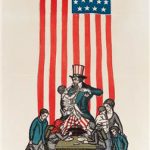 Jointly organized by: The American Austrian Fd., Austrian Academy of Sciences, Austrian Marshall Plan Fd. supported by the Botstiber Institute for Austrian-American Studies
Jointly organized by: The American Austrian Fd., Austrian Academy of Sciences, Austrian Marshall Plan Fd. supported by the Botstiber Institute for Austrian-American Studies
Time: 26.-27.09.2019
Venue: Austrian Academy of Sciences, Dr. Ignaz Seipel-Platz 2, 1010 Vienna
Program (PDF)
This year, 2019, marks a hundred years since World War I left Austria and other Central European countries devastated. Austria in particular suffered from the lack of food and fuel leading to widespread child malnutrition. 78% of all Austrian children under 15, and 92% of those in Vienna, were affected.
The American Relief Administration provided on average 300,000 hot meals a day to school children over a period of several years. Over 200,000 children were sent to Switzerland, the Netherlands and Scandinavia to escape the famine in Austria. Yet these, as well as a multitude of other international aid efforts from this period, have almost completely disappeared from the collective Austrian consciousness, despite the fact that there are an estimated one million descendants of children who benefited from this relief program.
Historians and scholars from Stanford and Oxford, as well as from Austria and other Central European countries, will highlight these extraordinary multinational efforts over one and a half days.
- Keynote Speaker: Leon Botstein, President, Bard College and Chairman Central European University: The Relevance of the Great Humanitarian Actions Post World War I Seen through a Contemporary Lens
- Guest of Honor: Eric Wakin, Deputy Director, Hoover Institution, Stanford University
Presenters in alphabetic order:
- Franz Adlgasser, Austrian Academy of Sciences: The American Relief Administration and Austria – Aspects of its Work
- Nikolay Bogomazov, St. Petersburg State University: “Food Barrier Against Bolshevism”: American Relief Administration Supplies to Russian Anti-Bolsheviks and Baltic States in 1919
- Mary Cox, University of Oxford: Hunger in War and Peace 1914-1924
- Tibor Glant, University of Debrecen: At the Crossroads of Politics and Relief: The American Red Cross in Hungary, 1919-1922
- Dieter Hecht, Austrian Academy of Sciences: Jewish Relief Organisations for Jewish Children in Vienna after World War I
- Barbora Jakobyová, Slovak Academy of Sciences: Post World War I Relief in Czechoslovakia: The Case of Czechoslovak Child Care
- Friederike Kind-Kovács, Central European University: Not just for a Summer: The Moral Dilemma of International Children’s Trains
- George H. Nash, South Hadley, Massachusetts: Master of Emergencies: Herbert Hoover and Humanitarian Relief of Austria after World War I
- Jenny Öhman, Uddevalla, Sweden: Austrian Children sent to Sweden
- Bertrand M. Patenaude, Stanford University: Deliverance: America’s Role in the Emergence of the New Central Europe
- Ursula Prokop, Vienna: Margaret Stonborough-Wittgenstein and American Food Aid to Vienna
- Chelsea Sambells, University of Huddersfield: The Emergence of Children’s Rights to the Practise of Protection: A Study of the Swiss-led Child Evacuations in the Second World War
- Renate Schreiber, Vienna: Swedish Aid after the First World War in Vienna
- Ulrich Schwarz-Gräber, Institute of Rural History, St. Pölten: Starving Countryside. The Work of the American Relief Administration in Vienna’s Hinterlands
via: https://www.ruralhistory.at/
